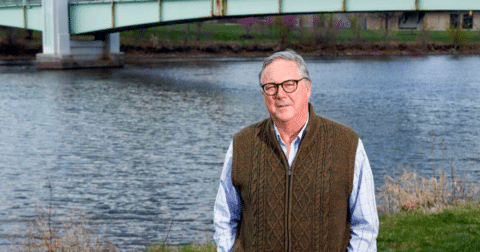Review
What Comes After Industrial Meat? A Future of Meat Without Livestock
Climate•4 min read
News
“I think we need to rethink agriculture,” the professor-turned-advocate tells Sentient.


Words by Nina B. Elkadi
Former University of Iowa researcher Chris Jones has announced an exploratory committee for Secretary of Agriculture in Iowa, a major step toward running for office. Jones, who currently serves as president of the environmental advocacy group Driftless Water Defenders, has long been a critic of industrial agribusiness in Iowa. He previously worked for the Iowa Soybean Association and Des Moines Water Works.
Jones is looking to change the status quo.
“I think we need to rethink agriculture,” Jones, who would run as a Democrat, tells Sentient. People are not getting the environmental outcomes they want, and farmers are not happy with the economic outcomes, he says. “Nobody’s happy. So why are we going to keep doing what we’re doing here with the corn, soy, CAFO scheme?”
Jones began writing for the public about issues related to Iowa water quality in 2016, when he oversaw a network of water sensors that measured pollution levels. He chronicled some of his research in a blog published on the University of Iowa website, which eventually became a space for him to write more broadly about Iowa’s water quality woes.
In 2017, a combined feedlot and methane digester project that was being built upstream from Bloody Run Creek illegally discharged stormwater into the creek during the construction process. As part of his university research, Jones installed a sensing station at the spring-fed trout stream to monitor water quality, and documented the details of the pollution on his university blog.
A few years later, Iowa State Senator Dan Zumbach — father-in-law of one of the owners of the feedlot-digester project — worked with the Iowa Department of Natural Resources to eventually get the digester and feedlot project approved, according to a Cedar Rapids Gazette investigation. Zumbach also reportedly used his legislative position to pressure Jones to stop writing his University of Iowa blog. This pressure came with an implied threat that funding for the water monitoring system could be impacted, alleges Jones, who decided to abruptly retire. Just a few weeks later, Zumbach co-sponsored legislation that shifted funding away from the Iowa Nutrient Research Center, which funded the sensors.
“This was sort of a brazen abuse of power,” Jones told Civil Eats.
Today, Jones writes about Iowa water pollution for an audience of over 5,000 subscribers, and in 2023 published his book The Swine Republic: Struggles with the Truth about Agriculture and Water Quality. A description from his publisher begins with: “Interested in the truth about Iowa and the Midwest’s water quality? You won’t get it from Iowa’s agricultural and political leaders.”
Iowa currently has approximately 124 million animals living in factory farms, and from Jones’s own calculations, those animals produce the same amount of waste as around 134 million people. Iowa has a human population of 3.2 million. The primary for state and federal offices is June 2, 2026. The general election is November 3, 2026. The incumbent, Republican Mike Naig, who has held the office since 2018, announced his re-election campaign in May 2025.